There is More Than One Way to Build a Green Roof
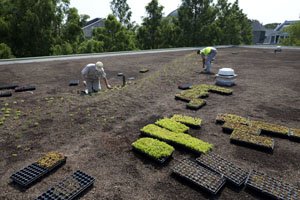 Last month Swarthmore College and the Scott Arboretum installed their fifth green roof on the Lang Performing Art Center’s six layered roof. All of our green roof installations were retrofitted to an existing roof, thus each one presented unique challenges and solutions. The latest install was no exception.
Last month Swarthmore College and the Scott Arboretum installed their fifth green roof on the Lang Performing Art Center’s six layered roof. All of our green roof installations were retrofitted to an existing roof, thus each one presented unique challenges and solutions. The latest install was no exception.
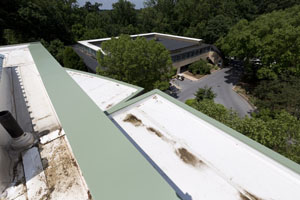
Roof membrane of the varying levels of the Lang Performing Arts Center roof. photo credit: L. Kesterson
Built in 1991, the Lang Performing Arts Center needed a new roof membrane this year; a perfect opportunity to add a green roof to an existing building. Changing this roof to a green roof will actually increase the life of roof membrane by threefold.
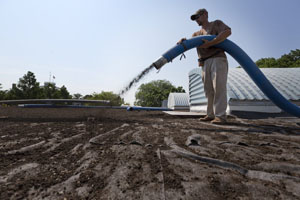
A large blower was used to spread the growing media over all the roof levels. photo credit: L. Kesterson
This three-story building has six different roof levels with varying load capacities, resulting in an extensive green roof with semi-intensive sections. To create this beautiful and ecologically conscious roof, several new to Swarthmore techniques were employed. In the past, we have used large super sacks to lift the growing media onto the roof. This time Green Roof Services used large blowers to spread the media over all the roof layers. This same technique was also used to apply water/protective mixture to the roof after “planting” the roof.
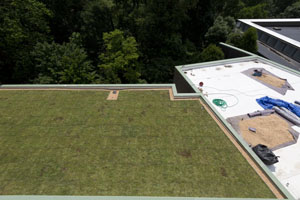
Sedum sod was rolled over this portion of the roof. You can see the preparation of the adjacent roof level. photo credit: L. Kesterson
Another difference in construction of this roof is how it was planted. Over the dance studios, the portion of the roof with the smallest load capacity, sedum sod was applied as opposed to sedum cuttings. It is similar to rolling sod into your lawn. This section consists simply of gravel and two inches of sod.
Over the theater, thanks to the requirements to make the theater sound proof, the roof could support a greater load. Here you can find ribbons of semi-intensive ten-inch mounded soil planted with grasses and sedum plugs.
The remaining roofs were planted with sedum cuttings, as was done on our other roofs, and sedum seed. The seed was applied with a broadcast spreader, just like you might apply it to your lawn. The addition of the seed is an economical way to fill in the roof more quickly.
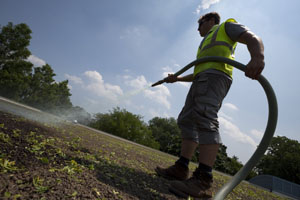
An initial application of water was sprayed to help the cuttings and seeds become established. photo credit: L. Kesterson
Learn more about creating a green roof in our video series: Building a Green Roof. Also check our schedule to join us on our fall tours of the green roofs .





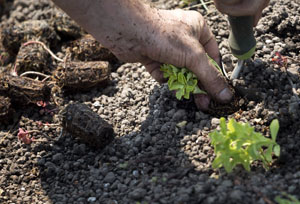
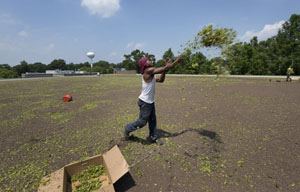
Louise Clarke
Posted at 13:49h, 16 JulyWhat have you planted on the semi-intensive sections?
Becky Robert
Posted at 14:03h, 23 JulySorry for the delayed response. Our coordinator of horticulture was on vacation. The following plants were planted as plugs in raised proportion of roof:
Sedum hybridum ‘Immergrunchen’
Sedum kamtschaticum var. floriferum ‘Weihenstephaner Gold’
Sedum kamtschaticum’
Sedum spurium ‘Fuldaglut’
Sedum spurium ‘Album Superbum’
Allium schoenoprasum
Talinum calycinum
Calamagrostis acutiflora ‘Karl Foerster’
Sporobolus heterolepis